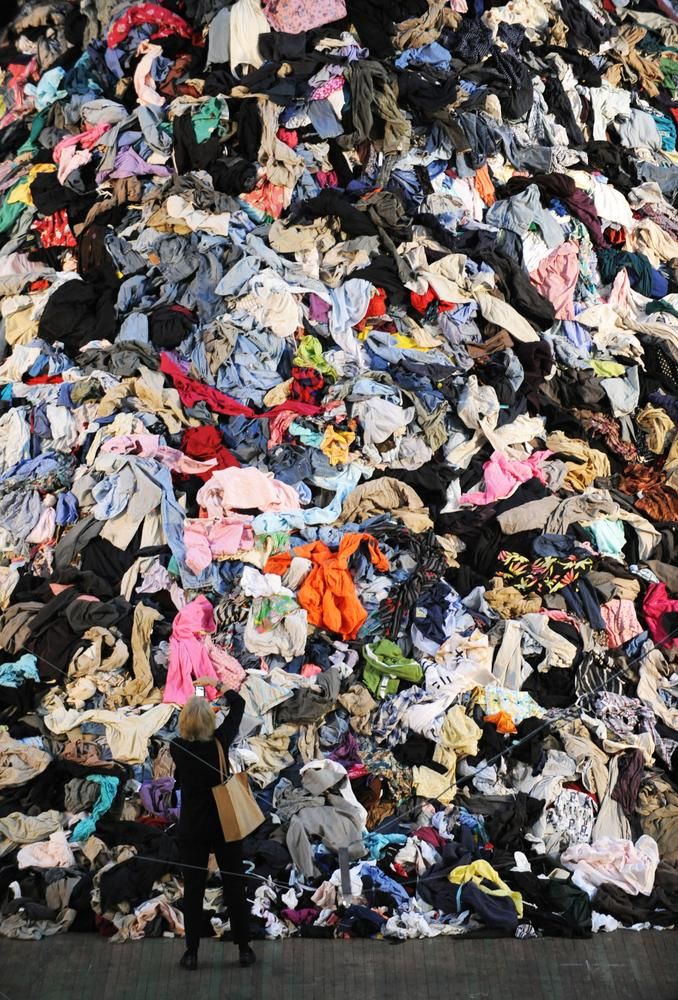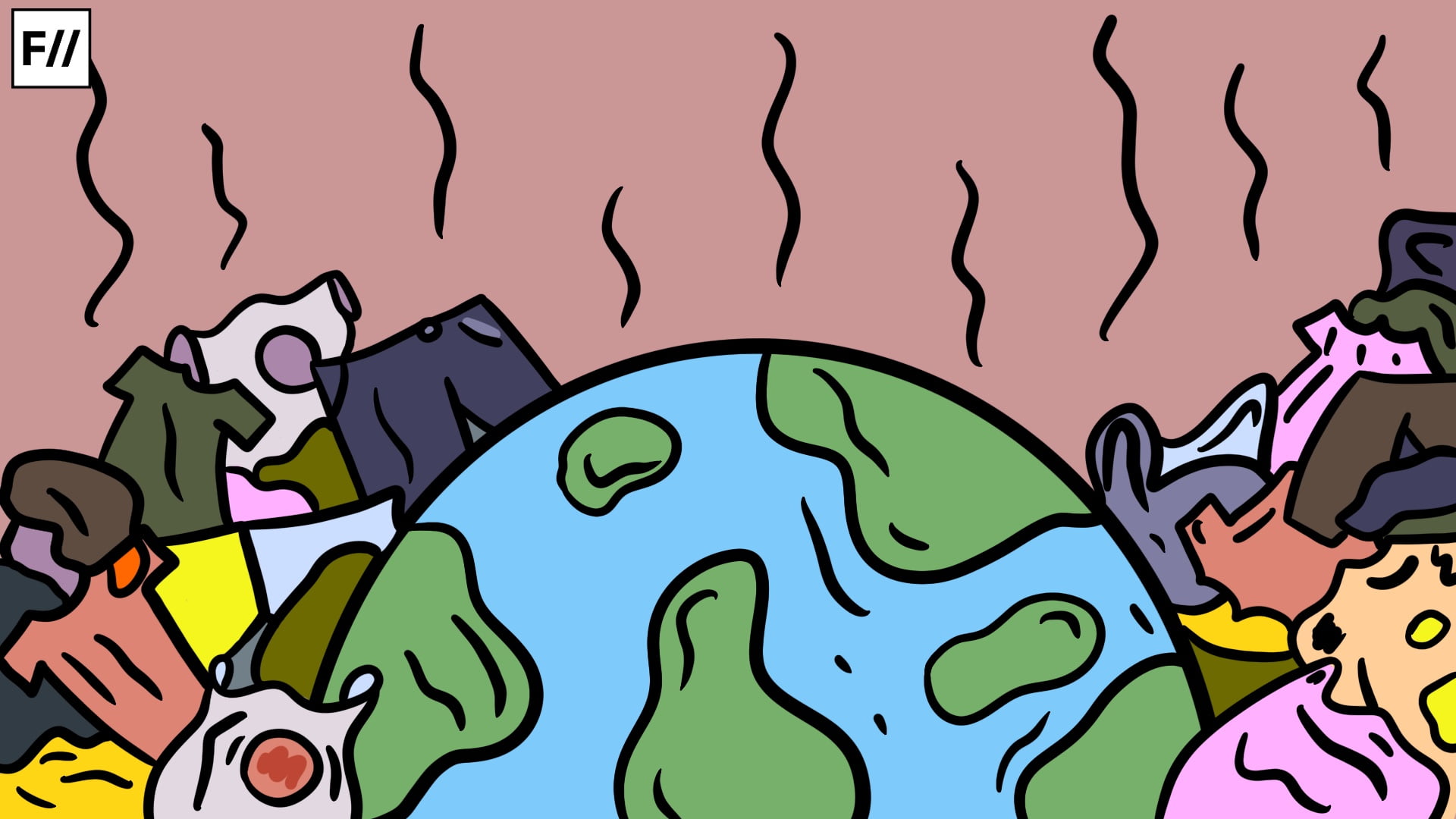Editor’s Note: This month, that is December 2019, FII’s #MoodOfTheMonth is Fashion, where we invite various articles on Feminism And Fashion (the fashion industry, fast fashion, fashion for Trans people, fashion for people with disabilities, fashion icons), that shape your life and your identities, either positively, or negatively or both. If you’d like to share your story, email us at pragya@feminisminindia.com.
“Did you check out Deepika Padukone’s new Instagram post? I have a huge crush on her dress already. I am going to buy a replica for the party next weekend.”
“You know, the colours I bought last summer are no more in fashion. I am going shopping this weekend.”
“My wardrobe has no formal clothes. I need to buy new clothes for office.”

At some point or the other, we all have had such instances in our lives. Every season there are new colours and styles. Celebrities flaunt designer clothes and the public goes crazy for them. Most of the shopping occurs because, “It looks amazing!!” or “This is the trend now-a-days!” or “I cannot wear the just-once-worn-dress because XYZ has already seen it” and not because it is necessary.
Celebrities flaunt designer clothes and the public goes crazy for them. Most of the shopping occurs because, “It looks amazing!!” or “This is the trend now-a-days!” or “I cannot wear the just-once-worn-dress because XYZ has already seen it” and not because it is necessary.
I became environmentally aware at the age of 11. I never bought products made from animal skin. I stopped burning crackers on Diwali, made sure no polythene bags were brought home and water wasn’t wasted. A few years later my suggestion of constructing rainwater harvesting pits in the garden was adopted by my parents. This helped in replenishing the underground water table. A budding gardening enthusiast then, I created a compost pit in my backyard to take care of my plants.
Data Doesn’t Lie!
Recently, I learnt the ugly truth of fast fashion.
According to a study, the clothing industry produces 20% of the world’s wastewater and 10% of global carbon emissions – more than all international flights and maritime shipping combined. Textile dyeing is the second largest polluter of water globally and it takes around 7571 litres of water to make a typical pair of jeans. To explain the gravity of this, let me rephrase – if you buy one less pair of jeans then, 1500 people can have one day of drinking water supply. Further, the average consumer buys 60% more pieces of clothing than 15 years ago. Each item is only kept for half as long.
To explain the gravity of this, let me rephrase – if you buy one less pair of jeans then, 1500 people can have one day of drinking water supply. Further, the average consumer buys 60% more pieces of clothing than 15 years ago. Each item is only kept for half as long.
Now rewind to the 90s. Remember the cloth cycle we used to follow?
Party wear -> Casual wear -> Daily wear -> Night suit -> Holi cloth -> Mop cloth
If a garment stayed in your wardrobe for two years before ending up in a landfill in the 90s, now it stays only for a year or less. I have been a victim of fast fashion myself – the street shopping at Colaba in Mumbai, the Sarojini market in New Delhi, the Park Street in Kolkata or the brands H&M, ZARA, and Forever21. A new wardrobe at a jaw-dropping price.

My Story
My consciousness provoked me to bring a change in my habits. I decided to do something about it. After all, drip drops make the ocean. I came across Slow Fashion Season 2019 on 12th June, 2019. The idea was to buy no new clothes for three months (21st June 2019 – 21st September 2019). I began my commitment early and extended it to footwear and accessories as well.
It was tough in the beginning. The first step was to unsubscribe to the emails from online shopping stores and stop visiting the offline stores. Out of sight, is out of mind. I had a silver jubilee anniversary celebration to attend. My mother insisted me to buy new outfits because the society might feel I don’t have enough clothes! I had my birthday within this time frame. My friends insisted on sending me outfits/bags as gifts. To actualise my commitment, my next step was to reject all such offers.
The third step was to reorganise my wardrobe. I categorised my clothes as per the cloth cycle of the 90s. I selected five sets of clothes and matching footwear as my workwear, and repeated it for three months. Lastly, I successfully avoided gifting any friend/family clothing or footwear as a gift.
Also read: The Dark Side Of Fast Fashion Your Favourite Brands Are Hiding
Now that sustainable choices became a part of my routine affairs, even after 21st September 2019, I decided not to give up. The temptations did not exist anymore. Not even once did I feel the need to buy something new – neither for my cousin’s engagement party, neither for my office parties nor for hanging out with my friends. My wardrobe was sufficient. Everyone knew about my commitment so their judgements (if they had any) about my clothing choices didn’t affect me. It has been six months now. With a wedding around the corner, I have decided to repeat all my just-once-worn clothes. My family, though skeptical of my choices, lauds my efforts in public.
Everyone knew about my commitment so their judgements (if they had any) about my clothing choices didn’t affect me. It has been six months now. With a wedding around the corner, I have decided to repeat all my just-once-worn clothes. My family, though skeptical of my choices, lauds my efforts in public.
Feminism & Fashion
Society has dictated the choices we make for long. My journey of fighting fast fashion on a personal level made me realise several things. I don’t have to wear new clothes every day to be confident about myself. I need to have life principles that I abide by. We are ‘told’ that the clothes we wear are a way of self-expression. Is it really? “Clothes aren’t going to change the world, the women who wear them will”. Most of the time it is the marketing gimmicks telling us what we want, just like the Fair & Lovely advertisement. My fashion choices express my concern for the environment. It is one of my tools for exercising my freedom of choice.

Fast fashion is an ecofeminist issue. We need to act now to save our planet. Planting trees, adopting a vegan lifestyle and ditching plastic cutlery isn’t the only way. Shop less and utilise more. You will be surprised by the savings in your bank account!
Also read: Infographic: How Can The Fashion Industry Become More Inclusive?
P.S. I am not in favour of giving away old clothes to get branded vouchers to buy new ones. You don’t know where the cloth goes. Donate old clothes to the needy and make sure you don’t give it to organisations who dump it in landfills.
Saumya Pandey is a Young Professional at NITI Aayog. She is an engineer by profession and environmentalist by heart. A theatre enthusiast, she actively volunteers for environmental causes. You can find her on LinkedIn.





Before reading this article, I had no idea about the extent of the amount of water that is wasted every second in the textile industry. After knowing this, I will surely keep a note of the points you mentioned to avoid being a victim of fast fashion. Though I myself try to put some efforts in saving the environment, but I am very much inspired by the efforts you do daily to save the planet which have become your habits now.
Very well written. Way to go Saumya. You will inspire the world soon.
Thank you Palak. I hope you commit to something like this and inspire more people around you. Drip drops make the ocean.
Thank you Palak. I hope you commit to something like this and inspire more people around you. Drip drops make the ocean.
I appreciate your dedication to rescue our environment. Today all of us are being dragged by the glitter of fake show off. We should be conscious enough to think what wrongs we can do to our environment while over consuming it.
Thanks for this initiation Saumya. Keep it up.
That’s true Divya. Social media is one of the culprit of the increased consumption. I hope this article helps understand the gravity of the situation.
Often reading facts don’t coax us into action. We always find it tough to follow through with resolutions because they seem exacting. Your personal story is testimony to the fact that with enough will power and determination, anything is possible.
I really appreciate the author mentioning that she did find following through with her resolution difficult yet, she kept going. Struggle is an important aspect of every journey!
Thanks Sugandhaa. It’s true that one needs to be fully committed to their beliefs. The sense of satisfaction I had after the first three months was incredible. I became more confident in my choices.
Loved it saumya i’m yet a school student so my mom doesn’t buy me much clothes thatswhy i mix n match to try new looks. Lately, i’ve been thinking why people are soo crazy after trends.
This article said my mind.
I have a wedding coming up n i decided not to buy any new clothes as i aldready have some from a family wedding last year.
I hope in next decade show off culture will change
Happy 2020?
Thank you so much Simran. I really appreciate what you are doing right now and what you plan to do in future. Keep inspiring people around you. Anyone can enact change and make a positive difference if they choose to. Good luck!
This is so inspiring Ma’am. I salute your commitment and will definitely try to follow the same. I never really thought of shopping as a potential threat to the environment. This article gave me a fresh perspective. Thanks and all the best.
Thank you and I am glad that this article helped you Akanksha. Good luck!
We need more of you.
Thank you Harshita! You can start being one of us.
It is truly helpful.. But I think I have heard the content from somewhere else. Hmm.. Patriot Act maybe?!? There was an episode on similar lines.
But anyways, not everyone watches it. So as I said, it’s always good to create awareness ?
Hey! Thanks for the appreciation.
As I mentioned, I started my act of buying no new clothes in June 2019 after I signed up for ‘Slow Fashion Season 2019’ (link is in the article). I did watch the video you are talking about (published on 25 Nov 2019) but this article is a personal journey. So they are very different.